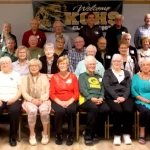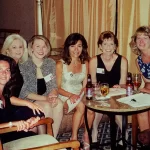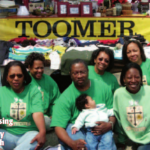by Bard Lindeman
On a rainy night perfect for amphibians, in a low ceiling rented hall, we gathered for the impossible task of reliving the last half-century. None of the obstacles, or hardships, seemed to matter as the Westwood (NJ) High School Class of 1946 staged its 50th anniversary reunion.
The long, crowded room was filled with friendship, laughter, good cheer and fond memories as gray-headed, thick-waisted men and women reached back to recall only good moments and buoyant times when we groped together toward adulthood.
There was only a brief opening speech from good guy, Herbie Hackbarth, who spent his adult life in Westwood and earned the privilege of being master of ceremonies.
When the recorded love songs from the 1940s and 1950s began, Bob Vogler, a planning committee stalwart, swept to the dance floor with his wife Winnie. In school, quiet, well-behaved Bobby Vogler spoke only when spoken to. And, forgive me, but I recall him carrying ten to fifteen extra pounds. Here was a lean, vigorous Vogler, enjoying himself and in command of his movements. From the sidelines, a woman classmate yelled out: “Hey Bobby, if I’d known you were going to turn out so good, I would have made a play for you!”
This autumn night was filled with surprises, both pleasant and unpleasant. Helen Dobroslavich Whalen, the workhorse who, more than any other individual, made the reunion happen, was aglow, because people had come from New York, Connecticut, Virginia, Arkansas, Pennsylvania, California, Florida, Maryland, Massachusetts, and other points, east and west. My wife Jan and I came north from Georgia. Clearly, everyone made considerable effort to attend.
When it was time to hand out the goofy prizes (“Who has the most grandchildren?” “Who has been married longest?”), Millicent Liccardi had come the greatest distance. A teacher of literacy among the Indians of South America, Millie – whom I remember only as quiet, unassuming, proper – had come from Coxipo da Ponte Mountain, Brazil. In her prepared biography, she wrote: “I have been working in Brazil since 1987 and in Bolivia between 1956-85 with Wycliffe Bible translators.”
Kenneth C. Rogers, whom we called “Kenny” and undervalued because he studied so often and so hard, came alone from Bethesda, Maryland, where he works “as a federal government official.” Modest, Rogers is a nine-year veteran of the United States Nuclear Regulatory Commission. Before that, he was president of Stevens Institute of Technology, in Hoboken, New Jersey, for fifteen years.
Since Rogers is a physicist and comfortable talking about “particle accelerators” and “optical spectroscopy,” I slid up to him with no idea what to ask. We stood in a corner and, inside of five minutes, struggled to retrace the years since 1946, when the world was so very different. I asked for his business card; encouraged by his friendliness, I promised to get in touch.
At our crowded table of ten – eight women, two men – classmates enjoyed one another, and talk was free and easy. Yet one of our pals, the victim of a stroke, sat silently, except to comment, “Golden years? Phooey!”
The tough assignment was seeing the carefree boys and girls of my youth showing the ravages of aging. Another friend, suffering with emphysema, sat all night, because he was too weak to stand, much less table-hop or dance.
Yet, the majority of this group of sixty-eight successful agers in a class of 119, showed themselves to be robust, socially speaking. Reading our biographies, I find one positive, contented declamation after another. “I am blessed with a beautiful family …” “Married my high school boyfriend. And they said it was just puppy love! …” “Things turned out much better than I thought they’d be. I feel really blessed…” “My life has been a series of joys and heartaches, but nevertheless intriguing and surprising…” “The Lord has blessed me with a wonderful wife of 42 years, a zest for life, and energy and enthusiasm to make each day an experience of wonder…”
We slipped through high school with World War II as our historical backdrop, losing one member, Robert Langer, killed at Iwo Jima, to the catastrophic struggle. Moreover, a handful of us were caught up in the Korean War, drafted to serve two years. As I look back, trying to call up the image of our reunion night, especially that sea of excited faces, so few of whom I recognized, I conclude there surely is a rich, bountiful Robert Michener-style novel inside the Class of 1946, Smalltown, USA.
Lastly, let the words of an absent classmate, Muriel Simon Ronay, serve as an epitaph to the once-in-a-lifetime experience: “Best wishes to our class of 1946 and, from John 3:16-17, I add: ‘May God shine his light along our paths and bless us in the coming years.’ “
About the author
Bard Lindeman is a synidcated columnist and the author, most recently, of Be An Outrageous Older Man.









